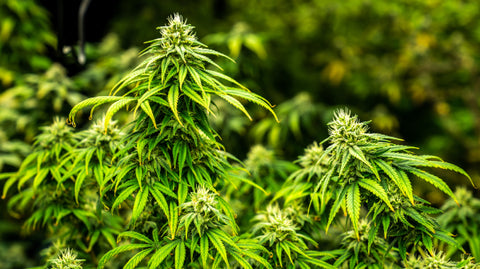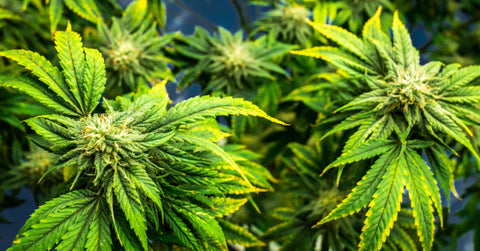
Tabla de contenidos
[HideShow]
CBD properties: how it acts on your body
In recent years, cannabidiol, better known as CBD, has captured the world's attention for its amazing benefits and applications in various areas of health and wellness. This compound, derived from cannabis, has become a topic of interest for both health professionals and the general public, unleashing a wave of curiosity and discussion. But what is CBD and what is it really for? We will explore the fascinating properties of CBD, unraveling the mysteries of how it works in the body and why it has generated such a stir in the scientific and medical community. From its use in therapeutic treatments to its positive effects on general well-being, we will delve into the heart of this substance to discover its true potential and the reasons behind its growing popularity.
CBD interacts with the body's endocannabinoid system, regulating functions such as pain, mood, sleep, and appetite. It has been associated with pain relief, reduced anxiety and inflammation, improved sleep, and neuroprotection. Furthermore, it does not produce psychoactive effects like THC.
Understanding the properties of CBD is essential to maximize its cultivation and take advantage of its health benefits. Learning how to plant CBD properly ensures a high-quality harvest and therapeutic potency.
What is CBD and what is it for?
Cannabidiol, commonly known as CBD, is one of more than one hundred chemical compounds, called cannabinoids, found in the cannabis plant. Unlike its more famous relative, tetrahydrocannabinol (THC), CBD does not produce psychoactive effects , meaning it does not cause the "high" feeling typically associated with cannabis. This characteristic has made CBD an attractive compound for those seeking relief from various health problems without the mind-altering effects.
CBD is primarily extracted from the variety of cannabis known as hemp, which has high concentrations of CBD and low concentrations of THC. This extraction process is usually carried out using methods such as supercritical CO2 extraction, a method that allows the CBD to be isolated and preserved, ensuring that the final product is free of solvents and contaminants.
Understanding what CBD is and what it is for is crucial in today's world of medicine and wellness. It has been researched and used for its potential therapeutic benefits, including anti-inflammatory, analgesic, anxiolytic, and anticonvulsant properties. Although research is still ongoing, studies suggest that CBD could be useful in treating a variety of conditions, including anxiety, epilepsy, chronic inflammation, and certain types of pain.

CBD properties
Cannabidiol (CBD) has gained notoriety in the scientific and medical field thanks to its multiple therapeutic properties. Understanding the properties of CBD is essential to appreciate how this compound interacts with the human body and contributes to various health and well-being processes.
- Anti-inflammatory Properties : CBD is recognized for its ability to reduce inflammation. This property is especially relevant in the treatment of chronic inflammatory conditions such as rheumatoid arthritis and inflammatory bowel disease.
- Analgesic Effects : Another notable aspect of CBD is its potential as an analgesic. This makes it useful in the management of chronic pain, including neuropathic pain and pain associated with diseases such as multiple sclerosis.
- Anxiety and Depression : In the field of mental health, it has been observed that CBD has anxiolytic and antidepressant effects, which can be beneficial for people with anxiety and depression disorders.
- Neuroprotection : Studies suggest that CBD may have neuroprotective properties, meaning it can help protect and regenerate nerve cells. This is of particular interest in diseases such as Alzheimer's and Parkinson's.
- Cardiovascular Benefits : CBD has also shown potential in improving cardiovascular health, helping to reduce high blood pressure and mitigate other risk factors associated with heart disease.
- Anticonvulsant Effects : One of the best-known applications of CBD is its use in the treatment of certain types of epilepsy. It has been shown to be effective in reducing the frequency and severity of seizures.
- Antioxidant Properties : CBD has antioxidant properties, meaning it can help combat oxidative stress and inflammation at the cellular level, contributing to general health and disease prevention.
- Antitumor Effects : Preliminary research suggests that CBD may have antitumor effects, inhibiting the growth of cancer cells in certain types of cancer.
What does CBD do in the Body?
To understand what CBD does in our body, it is crucial to understand its mechanism of action, especially in relation to the body's endocannabinoid system. This system is a complex set of receptors and neurotransmitters that play a critical role in regulating numerous physiological functions, including mood balance, pain, appetite, and memory.
- Interaction with the Endocannabinoid System : Unlike THC, which binds directly to cannabinoid receptors (CB1 and CB2), CBD acts more indirectly. Although its exact mode of action is still being researched, CBD is believed to modulate and alter the signaling of these receptors, influencing the release of neurotransmitters and producing therapeutic effects without causing psychoactive effects.
- Influence on Serotonin Receptors : CBD also interacts with other receptors in the brain, such as serotonin (5-HT1A) receptors. This interaction could explain its anxiolytic and antidepressant effects, since serotonin plays a crucial role in regulating mood and behavior.
- Anti-inflammatory and Analgesic Effects : CBD modulates the activity of enzymes and receptors related to inflammation and pain. For example, it reduces the proinflammatory activity of macrophages and affects pain signaling through various ion channels.
- Neuroprotection and Neuronal Plasticity : CBD has been observed to promote neurogenesis and provide neuroprotective effects, possibly through its influence on cannabinoid receptors and other cellular components involved in the survival and maintenance of neurons.

Considerations When Choosing CBD Products
The CBD market has seen exponential growth, offering a wide range of products ranging from oils and capsules to topicals and edibles. However, this proliferation has also brought with it challenges in terms of quality and regulation. Here we offer some key tips for selecting high-quality and safe CBD products:
- Check Purity and Quality : Look for products that clearly state their CBD content and are free of contaminants such as pesticides, heavy metals, and solvents. The presence of a certificate of analysis (COA) performed by an independent laboratory is a good indicator of product quality and transparency.
- Origin of Hemp : Prefer products derived from hemp grown in countries with strict agricultural regulations. This ensures that the hemp is grown following high quality and safety standards.
- Extraction Method : The CBD extraction method can affect the quality of the final product. Supercritical CO2 extraction methods are generally considered the safest and most efficient, as they avoid the use of chemical solvents.
- THC Concentration : Make sure the THC content in the product meets the legal regulations in your area. In many places, the legal limit is 0.3% THC by dry weight.
- CBD Type : Products may contain isolate, full-spectrum, or broad-spectrum CBD. While CBD isolate contains only cannabidiol, full-spectrum products include other compounds from the cannabis plant, such as terpenes and other cannabinoids, which could enhance the beneficial effects through the entourage effect.
- Consult Health Professionals : Before starting a CBD regimen, especially if you are treating a specific medical condition or taking medication, it is essential to consult a health professional. They can offer guidance on proper dosing and possible interactions with other medications.
- Understanding Local Regulations : Since CBD laws vary widely in different regions and countries, it is crucial to know and respect local regulations to avoid legal problems.

Leave a comment